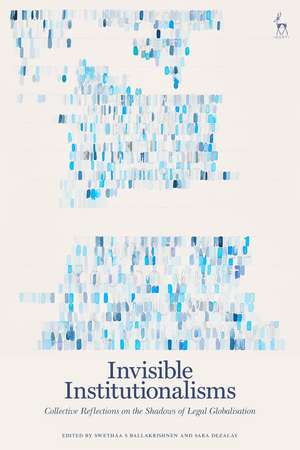Invisible Institutionalisms: Collective Reflections on the Shadows of Legal Globalisation
Editat de Swethaa S Ballakrishnen, Sara Dezalayen Limba Engleză Hardback – 10 feb 2021
| Toate formatele și edițiile | Preț | Express |
|---|---|---|
| Paperback (1) | 232.90 lei 6-8 săpt. | |
| Bloomsbury Publishing – 19 oct 2022 | 232.90 lei 6-8 săpt. | |
| Hardback (1) | 400.37 lei 3-5 săpt. | +32.74 lei 7-13 zile |
| Bloomsbury Publishing – 10 feb 2021 | 400.37 lei 3-5 săpt. | +32.74 lei 7-13 zile |
Preț: 400.37 lei
Nou
Puncte Express: 601
Preț estimativ în valută:
76.61€ • 79.99$ • 63.40£
76.61€ • 79.99$ • 63.40£
Carte disponibilă
Livrare economică 14-28 martie
Livrare express 28 februarie-06 martie pentru 42.73 lei
Preluare comenzi: 021 569.72.76
Specificații
ISBN-13: 9781509930210
ISBN-10: 1509930213
Pagini: 320
Dimensiuni: 156 x 234 x 27 mm
Greutate: 0.63 kg
Editura: Bloomsbury Publishing
Colecția Hart Publishing
Locul publicării:London, United Kingdom
ISBN-10: 1509930213
Pagini: 320
Dimensiuni: 156 x 234 x 27 mm
Greutate: 0.63 kg
Editura: Bloomsbury Publishing
Colecția Hart Publishing
Locul publicării:London, United Kingdom
Caracteristici
Presents reflective dialogue between young authors predominantly from the Global South through contributions and responses and reflections from key players in the globalisation theorisation mainstream script
Notă biografică
Swethaa S Ballakrishnen is Assistant Professor of Law at the University of California Irvine School of Law and affiliated faculty at the Harvard Law School Center on the Legal Profession. Sara Dezalay is Senior Lecturer in International Law and International Relations at the Cardiff School of Law and Politics.
Cuprins
COURSE 1Brulé and Sheikh1. G-local Women Power: Local Female Representation and Property Rights in India Rachel E Brulé, Boston University, USAArchive EnvyDanish Sheikh, University of Melbourne, Australia COURSE 2Goyal, De Sa E Silva, and Williams2. Of Footwear Clusters, Community Ties, and Institutional Tenacity Yugank Goyal, OP Jindal Global University, IndiaThree Paise and a Rough Agenda on How to Make the Invisible Visible Fabio de Sa e Silva, University of Oklahoma, USASearching for Space: Creating Room in Global Studies Christopher Williams, University of Chicago, USA COURSE 3Khorakiwala and Roy3. The Law, the Visual and Access to Justice in the Colonial Courts of India Rahela Khorakiwala is a lawyer and researcherThe Visual Culture of Law in India: A Response Suryapratim Roy, Trinity College Dublin, Ireland COURSE 4Basheer, Weissenbach, and Naudet4. Formalising Informal Innovation: Engendering an Epistemic Injustice?Shamnad Basheer was an Indian legal scholarSoliciting Testimony: The Challenge of Openness in the International Genetically Engineered Machine (iGEM) Competition Amy Weissenbach, Columbia University, USAAre Informal Resilience and Formal Emancipation Necessarily Incompatible? Jules Naudet, Centre d'Études de l'Inde et de l'Asie du Sud (EHESS), Paris, France COURSE 5Khan, Prasad, and Kroll5. Islamic Review in Pakistan: Problematising the Divide between Shari'a Courts and their 'Secular' Counterparts Maryam S Khan, University of Wisconsin-Madison, USANavigating Categories - Training, Positionality and PracticeGitanjali Prasad, iProbonoThe Judicial, the Secular and Beyond: Multi-normative Practices of Pakistani Constitutional Courts Stefan Kroll, Leibniz Peace Research Institute Frankfurt, Germany COURSE 6Palacios Lleras and Natarajan6. Competition Law in Latin America: 100 Years of Solitude Andrés Palacios Lleras is a Colombian lawyerMirrors, Mirages, and the Development Myth Usha Natarajan, The American University in Cairo, Egypt REFRACTION NOTESA. Opportunism and Reflexivity: Researchers Playing Double Agents to Study the Double Game of National Legal Elites in International Competition Bryant Garth, University of California, Irvine, USA, and Yves Dezalay, Centre National de la Recherche Scientifique, FranceB. Reflections on the Value, Risks, and Obligations of a Career as a Misfit Kate Bedford is an interdisciplinary scholarC. Genealogy of a Globalised Socio-Legal (and Feminist) Scholar Carrie Menkel-Meadow, University of California, Irvine, USAD. Learning to be a Legal Anthropologist Eve Darian Smith, University of California, Irvine, USAE. Living in the Contradiction: Globalisation and its Discontents David M Trubek, Harvard University, USAF. Commuting between Academy and Social Movements: Reflections of an Insurgent Feminist Kalpana Kannabiran, , Council for Social Development, Hyderabad, an ICSSR instituteG. Ballakrishnen and Dezalay's Feast: Guess Who's Coming to Dinner on the Island of Misfit Toys David B Wilkins, Harvard University, USAConclusion: Reading Between the Lines Sara Dezalay, Cardiff University, UK, and Swethaa S Ballakrishnen, University of California, Irvine, USA
Recenzii
Invisible Institutionalisms . marks an exciting step in conceiving of the edited collection as a location for conversation, rethinking the purposes and aims of scholarship. It is also an invitation to its readers to unmoor themselves from their existing perspectives-to maintain openness and remain curious.
From table to text, Invisible Institutionalisms reads like a banquet, a night of serious drinking during which leading scholars of globalization unwind, expose their intellectual autobiographies, driving passions, anecdotes, engagements, positions and purposes. Intimate, innovative and revealing this deftly edited collection of habile conversations leads us into the dark heart of the labyrinth.
In the best tradition of law and society scholarship, this timely volume unearths what is often invisible in legal discourse, especially regarding law and globalization. Encompassing a range of thoughtful and engaged scholars, the ensuing dialectic leads to thoughtful ruminations on power, representation, struggle, and the place of the scholar.
From table to text, Invisible Institutionalisms reads like a banquet, a night of serious drinking during which leading scholars of globalization unwind, expose their intellectual autobiographies, driving passions, anecdotes, engagements, positions and purposes. Intimate, innovative and revealing this deftly edited collection of habile conversations leads us into the dark heart of the labyrinth.
In the best tradition of law and society scholarship, this timely volume unearths what is often invisible in legal discourse, especially regarding law and globalization. Encompassing a range of thoughtful and engaged scholars, the ensuing dialectic leads to thoughtful ruminations on power, representation, struggle, and the place of the scholar.
